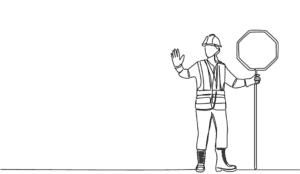
Developers argue that Mayor Michelle Wu’s high housing affordability rules have been a deal-breaker in obtaining the financing needed to build new projects to meet the region’s high demand for homes. iStock illustration
Mayoral contender Josh Kraft has released his plan to juice stalled housing production in Boston.
And it can be summed up simply as: build, baby, build.
The last time an incumbent lost a mayoral race in Boston was in the 1940s, so Josh Kraft has his work cut out for him as he looks to unseat Boston Mayor Michelle Wu this fall.
Last week, Kraft issued a plan for tackling what is arguably Boston’s biggest challenge right now, the collapse in private sector housing production over the past few years and the upward pressure that’s putting on prices and rents, as Steve Adams details elsewhere in this issue.
And at least when it comes to his plans to revive new housing development, Kraft has exhibited far greater creativity and flexibility in the week he’s officially been in the race than Wu has in three years in office.
Kraft’s Big Ideas
Kraft’s proposal calls for dropping the Wu administration’s 20 percent affordable requirement for new apartment and condo buildings, lowering it to 13 percent, where it was under the Walsh administration.
Developers argue that the new requirement, which effectively guarantees they will lose money on a fifth of all new units built, is a deal-breaker in obtaining the financing needed to build new projects.
Kraft’s plan would also raise the income level of who is eligible to rent or buy these affordable units, capturing a larger share of middle-class Bostonians.
Kraft is pairing this with an opt-in rent control program: apartment building owners who agree to cap rent increases would get a 20 percent break on their real estate taxes.
So how would Kraft, son of the Patriots owner and a veteran nonprofit exec, pay for it all?
Apparently, with some of the millions in new tax revenue that jumpstarting stalled housing projects would create.
And as they say, that’s the plan, anyway.
Mayor Fires Back
In one of her regularly scheduled appearances last week on GBH’s Boston Public Radio last week, Wu pushed back – and pushed back hard.
She derided Kraft’s tax break plan aimed to limiting rent increases as “fake rent control,” and on that issue, she may have a point.
Wu also defended her decision to hike affordability requirements for new apartment and condominium projects, arguing the shift is not to blame for all the projects that are stuck on the drawing boards, unable to break ground.
Wu argued that there are thousands of units in stalled projects across the city that were permitted under the old Walsh administration rules, which required that new projects have 13 percent affordable housing, not 20 percent as her administration began mandating last fall.
Wu Ignores Some Quiet Realities
However, it’s not as clear a picture as that. The Wu administration has pushed developers, in a number of cases, to meet higher affordability standards even before the new rules went into effect.
And Wu’s comments also ignore the experience of other cities, with San Francisco having rolled back its own 20 percent affordable requirement in 2023 in response to years of lagging production.
Cambridge has also struggled to produce new housing since it went to 20 percent in 2017, with the mandate yielding just 157 affordable units over seven years, a city report found last year.
In her dismissal of concerns about the 20 percent standard, Wu seemed to suggest she does not think it has imposed a significant additional burden on developers.
That ignores the fact that Boston was already one of the most expensive cities in the country to build in before her administration decided it was the perfect time to heap additional costs on struggling projects.

Scott Van Voorhis
Kraft Isn’t Somebody’s Stooge
But the mayor should have quit while she was ahead, for she topped off her rather weak arguments with a whopper of an accusation against Kraft.
Wu suggested that Kraft had been “recruited by the real estate and wealthy development community” in order to undo her administration’s oh-so-wonderfully productive affordable housing programs.
Given his family’s wealth, it stretches credulity to think that Kraft, who could spend his days doing whatever his heart desires, is simply running to be someone else’s stooge.
Kraft and Wu clearly have very different visions on the problems facing Boston now and how to solve them.
For his part, Kraft has spent decades as a nonprofit executive in Boston and has clearly built up his own network of friends and allies.
There’s no need for cheap shots.
Scott Van Voorhis is Banker & Tradesman’s columnist and publisher of the Contrarian Boston newsletter; opinions expressed are his own. He may be reached at sbvanvoorhis@hotmail.com.





